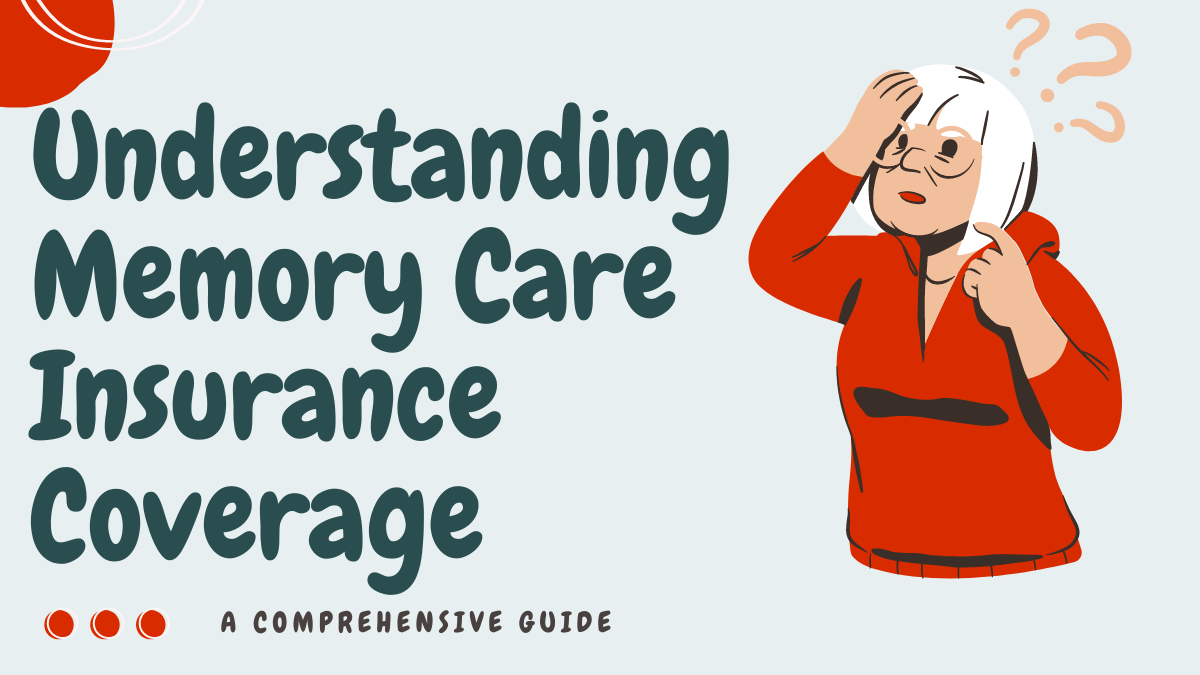Understanding Memory Care Insurance Coverage: A Comprehensive Guide

Welcome to our comprehensive guide on understanding memory care insurance coverage! As we embark on this journey together, let’s venture into the realm of memory care services and demystify the often overlooked aspect of insurance coverage. Whether you’re a concerned family member, caregiver, or simply seeking valuable insights in this field, we’ve got you covered.
Join us as we navigate through the intricacies of memory care insurance plans, uncover essential terms and conditions, and empower you with knowledge to make well-informed decisions for your loved ones’ wellbeing. Get ready to unravel the complexities and embark on an empowering learning experience that will uplift both your heart and mind!
Table of Contents
What is Memory Care Insurance Coverage?
As we age, it’s important to have insurance coverage that will protect us in the event of an illness or injury. One type of insurance that is essential for seniors is memory care insurance.

Memory care insurance is a type of long-term care insurance that helps cover the cost of memory care services. Memory care is a specialized type of care that is designed to meet the needs of individuals with Alzheimer’s disease, dementia, and other cognitive impairments.
Memory care insurance policies vary, but most will cover some or all of the cost of memory care services. These services can include:
- Home health aides
- Adult daycare
- Respite care
- In-home caregivers
- Specialist doctors and therapists
Commonly Covered Services
A comprehensive memory care insurance policy will cover a wide range of services related to the diagnosis and treatment of memory care disorders. Some of the most common services that are covered by memory care insurance policies include:
- Doctor visits: Memory care insurance will cover the cost of visits to your primary care physician, as well as specialists like neurologists and psychiatrists.
- Outpatient care: If you need to see a therapist or counselor on a regular basis, your memory care insurance policy will likely cover the cost of these visits.
- Inpatient care: If you ever need to be hospitalized for treatment, your memory care insurance policy will cover the cost of your stay.
- Medications: Most memory care insurance policies will cover the cost of prescription medications that are necessary for the treatment of memory disorders.
- Alternative therapies: Some policies will also cover the cost of alternative therapies, such as acupuncture or massage therapy.
When To Look Into Memory Care Insurance?
As people age, the likelihood of developing dementia or Alzheimer’s disease increases. Memory care insurance is a type of long-term care insurance that helps cover the cost of memory care services.
Memory care insurance is designed to help cover the cost of memory care services, which can be very expensive. Memory care insurance policies typically have a benefit period of two to five years and a maximum benefit amount of $150,000 to $300,000.
When should you look into memory care insurance?
If you or a loved one are experiencing memory problems, it’s important to speak with a doctor to determine the cause and severity of the issue. If the cause is determined to be dementia or Alzheimer’s disease, it’s important to start thinking about long-term care options and how you’ll pay for them.
Memory care insurance can help cover the cost of memory care services, so it’s worth considering if you or your loved one will need these services in the future.
Common Exclusions from Memory Care Insurance Policies
Memory care insurance policies typically exclude pre-existing conditions, experimental treatments, and persons over the age of 65. Pre-existing conditions are any medical conditions that existed prior to the policy effective date. Experimental treatments are those that are not yet proven to be safe and effective. And persons over the age of 65 are not typically covered because they are more likely to need memory care services.
Who Pays for Memory Care Services?
There is no one answer to this question as the cost of memory care services can vary greatly depending on the type and severity of dementia, the location of the care facility, and the types of services required. That said, it is important to understand that memory care is generally not covered by traditional health insurance plans.
If you or a loved one are in need of memory care services, your best bet is to contact your local Area Agency on Aging. They can help connect you with resources in your community that may be able to help offset the costs of memory care. Additionally, many states have programs that offer financial assistance for those in need of long-term care services.
How to Choose a Memory Care Plan?
There are a few key things to keep in mind when choosing a memory care plan:
- Make sure the plan covers all of the services your loved one needs.
- Choose a plan with a good reputation and plenty of satisfied customers.
- Be sure to compare costs between different plans before making a decision.
- Make sure the plan you choose is backed by a reputable insurance company.
- Get all the facts about each plan before making a decision, and don’t be afraid to ask questions.

Ways to Make Memory Care More Affordable
As the population of aging Americans continues to grow, so does the demand for memory care. Memory care is a specialized type of long-term care that provides around-the-clock assistance and support for people with Alzheimer’s disease, dementia, and other cognitive impairments.
While the majority of people over the age of 65 will eventually need some form of long-term care, memory care is often more expensive than other types of care. The average cost of memory care in the United States is $5,064 per month, or about $61,768 per year.1 Compare that to the average cost of assisted living ($4,000 per month) or home health aides ($21 per hour), and it’s easy to see why financing memory care can be a challenge for many families.
There are ways to make memory care more affordable, however. Here are a few suggestions:
- Shop around for the best price. Costs can vary widely from one facility to another, so it pays to do your research. Be sure to compare not only prices but also quality of care and amenities offered.
- Consider sharing a room. If you have a spouse or partner who also needs memory care, you may be able to save money by sharing a room at a facility. Some states even offer discounts for couples who share a room in a nursing home or assisted living facility.
- Look into government assistance programs. There are a variety of programs available for people who qualify, including the Veterans Administration’s Aid and Attendance benefit program and Medicare-funded long-term care insurance policies.
- Take advantage of respite care. Respite care provides temporary, short-term care so that family caregivers can have a break from their responsibilities. Depending on the provider, prices may be lower than those of regular memory care facilities and can even be covered by health insurance or Medicaid in some cases.
- Consider home-based care. Home health aides can provide companionship, assistance with activities of daily living (ADLs), medication management, therapy services, and more—all at a lower cost than memory care in a facility setting.
Memory care is an important consideration for many families as they plan for their loved one’s future needs. With careful planning and research, it is possible to find ways to make memory care more affordable.
Summary
When it comes to insurance for memory care, there are a few different types of coverage to be aware of. First, there’s private insurance, which is insurance that you get through an employer or that you purchase yourself. This type of insurance typically has lower premiums and higher deductibles than Medicare or Medicaid.
Next, there’s Medicare, which is a federal health insurance program for people who are 65 and older or who have certain disabilities. Medicare doesn’t cover long-term care, but it can help cover some costs associated with memory care, like hospice care and some prescription drugs.
There’s Medicaid, which is a state-run program that provides health coverage for low-income people. Each state has different rules about who qualifies for Medicaid, but in general, if you qualify for Medicare, you also qualify for Medicaid. Medicaid can help cover the cost of long-term care, including memory care.
So what does all this mean for you? If you’re considering memory care for yourself or a loved one, it’s important to understand the different types of insurance coverage and how they might affect your ability to pay for memory care. But don’t worry – we’re here to help! In this comprehensive guide, we’ll cover everything you need to know about understanding memory care insurance coverage.






